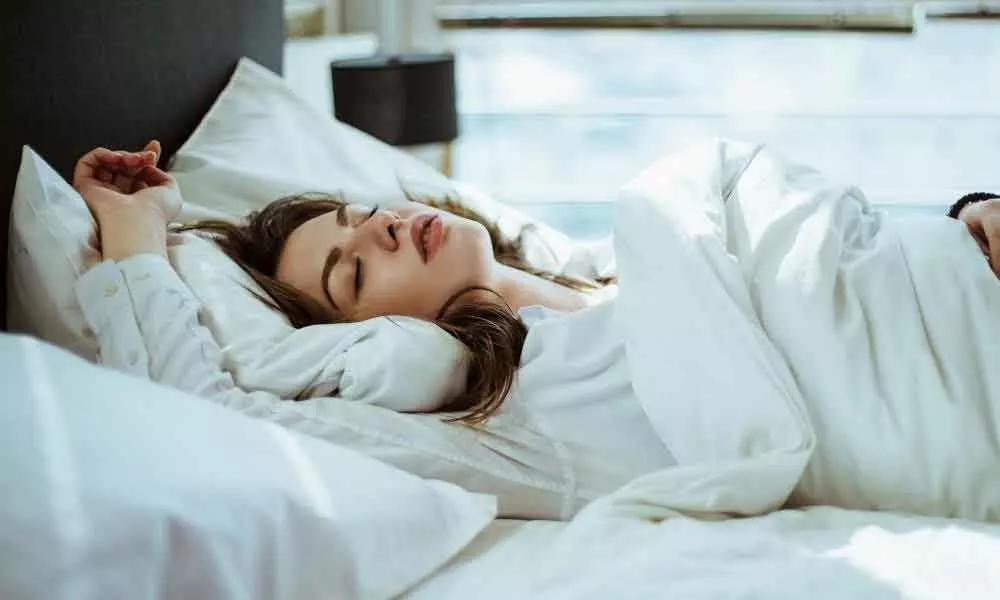Live
- India set to become developed nation by 2047: Haryana CM
- Allu Arjun’s house attacked by protesters demanding compensation for the stampede victim
- Several Gulf countries impose visa ban on Pakistanis over their involvement in crime, fraud and begging
- Public outrage in Jharkhand's Giridih over murder, police station gheraoed
- Santosh Trophy: Meghalaya edge Goa 1-0 to secure QF berth
- Army's swift action prevented Kolkata fire from spreading: Defence Ministry
- State Police tried to murder Ravi- Union minister
- FDI flow into India from Gulf countries surges to $24.54 bn in 12 years
- BBL: McSweeney hits fiery 78 to guide Heat to thrilling win after Australia snub
- 'Exceptional case..': Delhi HC orders revision of CLAT-2025 results
Just In
Know your Sleep better- Is your sleep aging you?


Good night’s sleep has long been heralded as the fastest route to a youthful complexion.
Good night's sleep has long been heralded as the fastest route to a youthful complexion. It's the time when the body repairs itself, increasing blood flow to the skin to help rebuild collagen and repair UV damage – the skin's biggest ager.
"Poor sleep can wreak havoc on your complexion, as not getting enough rest can result in dark under eye circles, dull skin, fine lines and wrinkles, and can even increase drooping around the corners of eyes and lips,"
Unfortunately, many older adults often get less sleep than they need. One reason is that they often have more trouble falling asleep. A study of adults over 65 found that 13 percent of men and 36 percent of women take more than 30 minutes to fall asleep.
Also, older people often sleep less deeply and wake up more often throughout the night, which may be why they may nap more often during the daytime. Nighttime sleep schedules may change with age too. Many older adults tend to get sleepier earlier in the evening and awaken earlier in the morning.
There are many possible explanations for these changes. Older adults may produce and secrete less melatonin, the hormone that promotes sleep. They may also be more sensitive to -- and may awaken because of -- changes in their environment, such as noise.
Older adults may also have other medical and psychiatric problems that can affect their nighttime sleep. Researchers have noted that people without major medical or psychiatric illnesses report better sleep.
Not sleeping well can lead to a number of problems. Older adults who have poor nighttime sleep are more likely to have a depressed mood, attention and memory problems, excessive daytime sleepiness, more nighttime falls, and use more over-the-counter or prescription sleep aids. Poor sleep is also associated with a poorer quality of life.
Many people believe that poor sleep is a normal part of aging, but it is not. In fact, many healthy older adults report few or no sleep problems. Sleep patterns change as we age, but disturbed sleep and waking up tired every day are not part of normal aging. If you are having trouble sleeping, see your doctor or a sleep specialist. There are treatments that can help.
How does sleeping with a pillow affect your skin?
Sleeping on your back is always a good way to sleep. Maintaining the 20-30-degree angle allows better fluid drainage in the body. However, many choose to sleep on the side or on their stomach. This pushes the face into the pillowcases, which has bacteria or even the creams or any product we have used on our face. The best solution is to clean pillowcases on a frequent basis, as it can cause zits or even rashes.
How does sleeping on your stomach affect your skin?
Many people love to sleep this way, but it's the worst way to sleep for anyone. As when we sleep, our skin needs to breathe. This position pushes the whole face into the pillow, which obstructs the skin's follicles. This causes clogged pores, acne, and lines. We don't allow enough circulation in this position, the pressure also causes puffy eyes and under eye bags. Your facial structure gets pressed against pillow every night for 8 hours—that's a lot of pressure for your skin. Eventually, this position can make your face flatter and trigger wrinkles. To avoid all this, one should not sleep in this position.
How does sleeping on your side affect your skin?
This position causes less damage to the skin than the stomach position. However, this isn't the ideal position either. When you sleep on your side, you put tremendous pressure on one side. It flattens the cheekbone and triggers wrinkles on the side because of all the friction and pressure. Also, if you have applied any skincare product, the product might spread on the pillow and not get absorbed by your skin.
How does sleeping on your back affect your skin?
Sleeping on the back is an ideal position for sleeping! First, you are not applying much pressure on your facial skin; this will cause fewer fine lines, less flattening of the facial contours and will make your skin younger and smoother. In comparison to sleeping on the side or on the stomach, fluid won't accumulate around your eyes making them puffy. Also, your face won't touch the pillowcase, avoiding the back-and-forth exchange of oils, dirt, and grime. This will prevent skin irritation or zits!
Let your skin heal itself overnight by sleeping on your back. This may be hard to learn for some, but it's truly a skin savior!

© 2024 Hyderabad Media House Limited/The Hans India. All rights reserved. Powered by hocalwire.com






